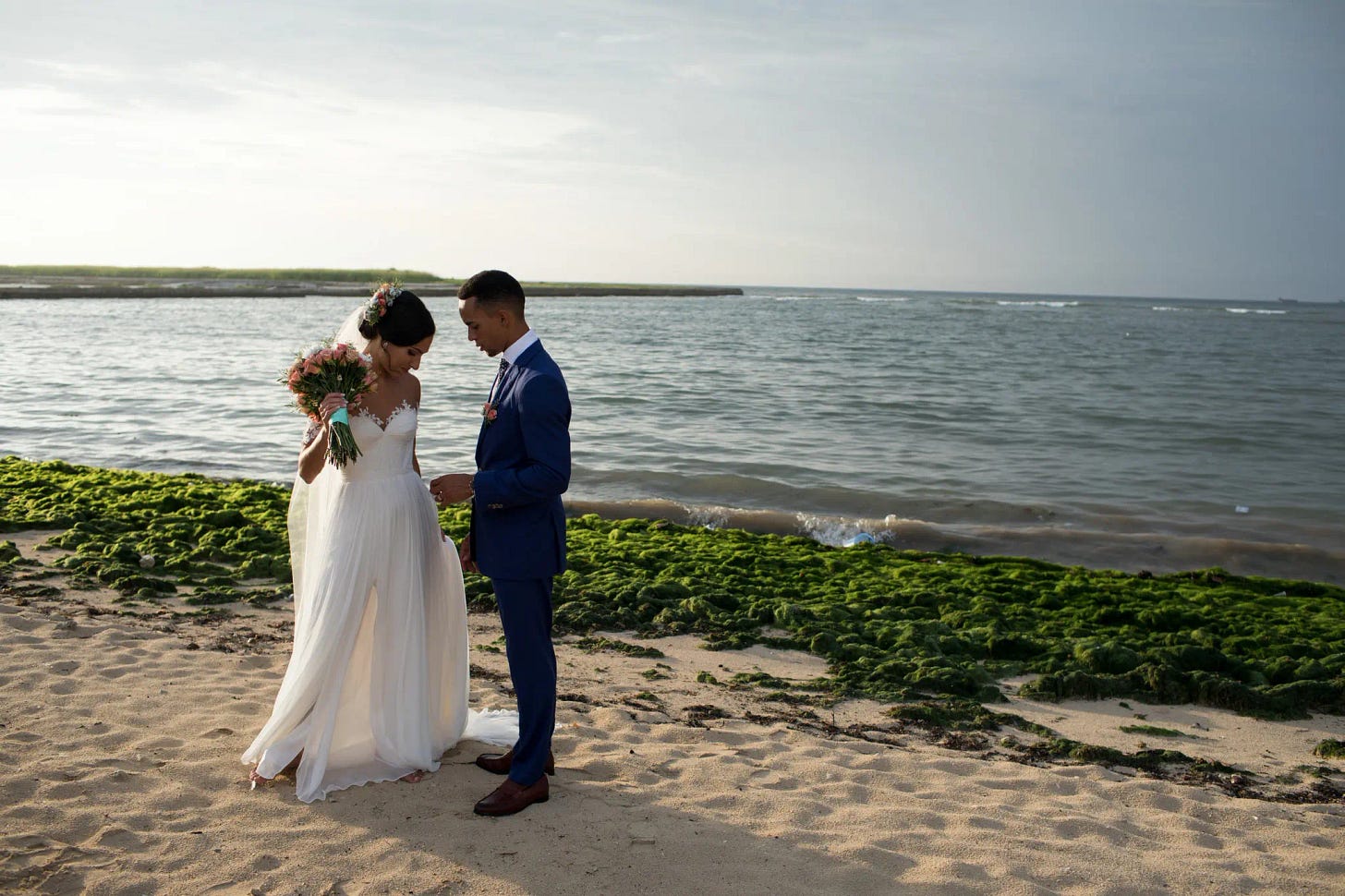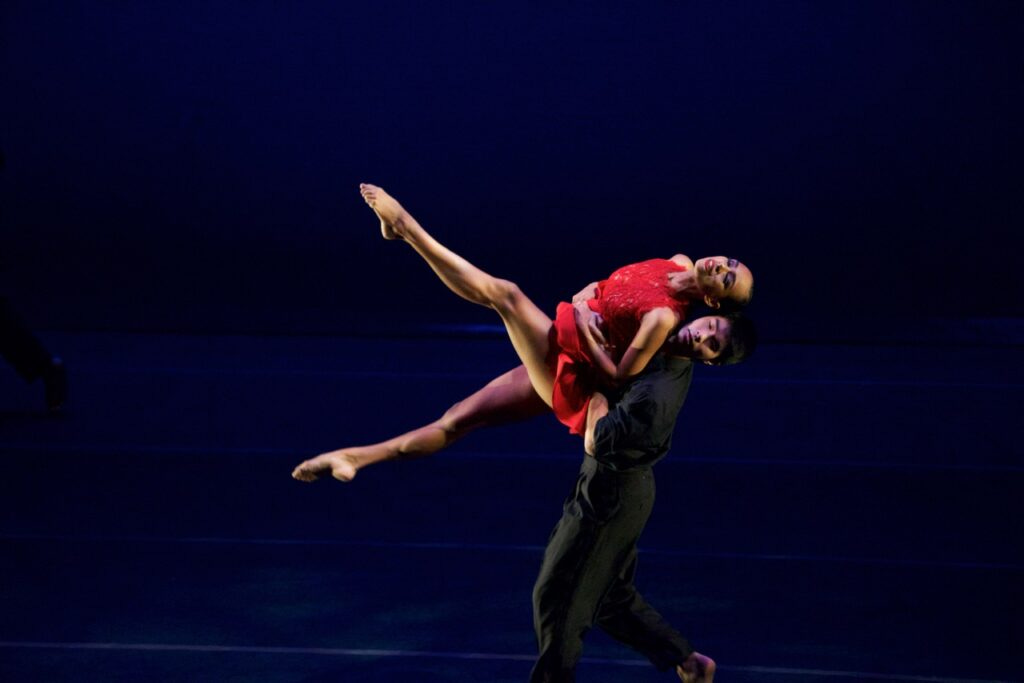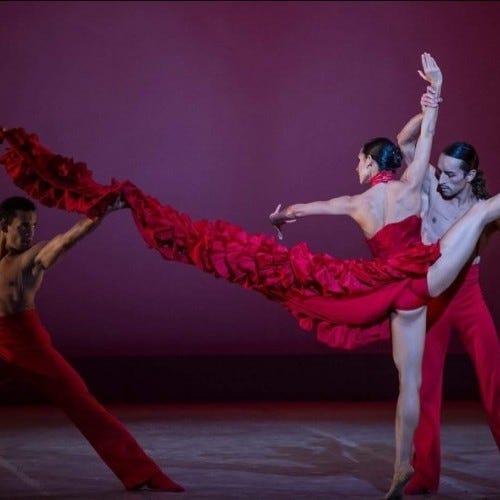Melissa Verdecia: On a problematic industry and evolving with age
Advice from a dancer and choreographer
Meet our next creator, Melissa Verdecia:
Melissa Verdecia
Age: 34
Kids: Liam, 2 1/2; Melissa is expecting her second child in September
Vocation: Dance artist, choreographer, and educator
Location: Miami
Link: Instagram
This week I had the pleasure of talking with Melissa Verdecia, a dancer, choreographer, and educator. Melissa started dancing classical ballet at the age of five and later attended the New World School of the Arts in Miami, which introduced her to modern dance. She then went on to Juilliard, where she studied contemporary dance, a combination of ballet and modern. Upon graduation, Melissa joined the dance company Ballet Hispánico, which fuses Latin dance with modern and ballet. In short, Melissa was crushing it and at the top of her game.
Starting a family is disruptive no matter the creative field you work in, but it is especially challenging when your body is your art form and your work is dependent on others, like a dance company. Below, Melissa recounts her very disappointing experience. But what stood out to me was 1) her and her husband’s ability to evolve and adapt, and 2) the bravery that having a child can give a woman.
When Melissa and her husband, who was also a dancer, left their dance company in New York and returned to her hometown of Miami, they made it work. Melissa is now freelancing as a dancer and choreographer and teaching classes, and because of that, she’s able to make her family her priority.
Her husband pivoted away from dance entirely. “He created his own home improvement business, painting interiors, exterior pressure cleaning, everything. He’s very creative and crafty. He’s Cuban, and in Cuba, there’s such a scarcity of materials and things that you have to get creative. It’s the only way for survival. So I think innately he had that ability to switch careers and switch gears.”
But to get to this place they’re at, Melissa had to stand up to her director and make the best choice for her and her family instead of the dance company. Many women can find that type of bravery only when the source is stemming from their child and not themselves. Motherhood, through evolution and instinct, gives us great courage—hence the mama bear stereotype. I feel this. I’m not someone who is brave. I hate being the center of attention. I’m terrified of spiders. If one of my children sneaks up behind me, I need an hour for my heart to recover. But, because of them, I can now do superhuman feats, like talk to strangers when necessary, make phone calls to schedule appointments, and tell a little bully on the playground to fuck off. Once, I nearly got into a death match with…a goose. Don’t laugh. Those birds are mean. When one looked like it was going to attack my little baby on a picnic blanket, I jumped between them, and I swear I was ready to bite that goose’s head off.
This is one of the magical things about having children: They push us to the extremes; they put us in situations we would never be in otherwise; they demand more from us than any other person ever will. Sometimes that brings out the worst in us—the yelling, the crying in the bathroom, the secret thoughts that you tell nobody—but other times, it shows us that we are stronger, braver, and wiser than we ever thought we could be. They teach us what the oft bandied-about phrase “unconditional love” actually means and how, not unlike the universe that mysteriously expands nonstop into nothingness, that love, that unconditional love, continually expands into spaces we didn’t know exist.
Now, Melissa, in her own words…
On the pandemic forcing her hand:
My husband is also a dancer. We met at Ballet Hispánico and got married in 2018. We had always known that we wanted kids, and I definitely wanted a lot of kids. But like most dancers, I struggled with, when’s the right time? Because I’m at my peak and having a child requires a lot of time off. So I was always postponing it. In my head, I was like, I want to do it intellectually. But then in my heart, I was like, I’m not ready to leave the stage. I was getting a lot of lead roles at Ballet Hispánico, and I felt like career-wise, I was happy. I didn’t want to disturb that flow.

Then the pandemic happened. My husband and I were like, well, I think that’s a sign from God. We should try. We got pregnant on the first try, and then I gave birth to my son in December of 2020.
On an industry with little compassion:
The way the contracts work, you start in August and you finish in July. We told our director that our goal is to finish this current contract and then do just one more year because we recognize that it’s going to be challenging to tour with Liam. We could sense our priorities were changing. Well, our director was not happy with the fact that we wanted to leave. He wasn’t supportive. It’s really sad, and it’s something that happens a lot in this industry. When I told him I was pregnant, instead of being like, congratulations, the first thing he asked me was if the apprentice knew my role. I never got over that. It hurt me a lot.
My husband and I were two of the core dancers in the company. I’d been with the company for nine years. You expect some kind of loyalty or just compassion. That made me realize that in this industry, directors are just looking out for their interests. They’re looking out for their productions, their casting. So my husband and I decided to end our contracts earlier, and then instead of doing one more season, we just did a half season. And then we moved back in August of ’21 to Miami.
It’s not a dance thing, it’s an American thing:
Dancers should have the right to have a family. By the time we retire, we’re at our midlife, so it’s hard to start planning a family then. There has to be a way to find a middle ground, right? A balance between supportive employers and productive employees. And I think it’s possible. There are many companies in Europe that do it. Why can’t we do that in America? I know in Sweden and in Germany, they give parents a whole year off paid, and they hold their spot in the company. I understand that we’re not supported by the government in the same way that a European company would be. But I think because there’s more awareness now of equity and equality, why can’t we ask the government for grants? I think it has to become something more common and more accepted. But it’s time.
On revisiting old work with a new perspective:
I’ve always loved choreographing ever since my Juilliard days. Peter London, in 2015, asked me to choreograph for his company, which was fairly new at that time. And then every year he kept inviting me back to choreograph. That gave me an excellent platform to practice my skills.

And then back in the spring, he asked me to restage the piece that I created for his company in 2015. And I thought, Oh my God, how full circle. Because when I created that, I was such a different person, like artist, woman, everything. So it was really nice to go back and look at where my mind was at that point, artistically and choreographically, and then add more nuances to the piece.
I hadn’t seen it in eight years. When I saw it again on video, I saw that there was some really cool stuff. I was a newer choreographer, so I wasn’t as polished. But there were some things in there that made me realize that when you’re young, you’re less inhibited, and you’re more willing to take risks. When you get older, you feel like you’re going to be judged. So I noticed some things in my choreography that I wouldn’t do now.
I didn’t change much, but what I did change or emphasize was the mood and the feeling of the piece. I realized that when I first did it, I was so concerned with the movement and the architecture of the piece that I never coached the dancers on their character. So this time around, I wanted them to understand what they should be feeling or what the motive was emotionally.
On how having a child changes more than just your body:
You never feel completely the same like you were back then. But I think that is the plus side to it. You have a sensibility that dancers who haven’t had children don’t have. I feel like I could approach the movement and the story of the piece with a lot more depth and understanding.
At this point, because of my age and my time in the company, I recognized my priority. I looked at my son and I said, no matter what happens, he is my number one. It’s not whether I had the perfect show or not. That wasn’t my my goal anymore. My goal was to be the best mom to him that I could be. That’s the biggest thing with a dancer who becomes a mom: your priority shifts, and your breath and your air isn’t dance anymore. It’s your child.
It was beautiful and scary all at once to recognize that. But I do believe that it gave me the power to go up to my director and say, that’s it. We’re breaking our contract because this is my priority. I ruined his plans for the year and his production. But at the end of the day, family was higher on my list, and I was at peace with that.
Thank you, Melissa, for sharing your story!
*Interview has been edited for length and clarity.







